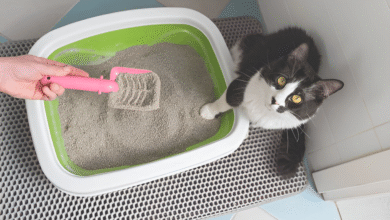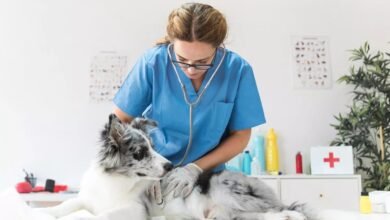
The Importance of Dental Care for Pets
Our furry friends bring immense joy to our lives. They are loyal companions, offering unconditional love and endless moments of happiness. As responsible pet owners, it’s our duty to ensure their well-being, and one often overlooked aspect of their health is dental care. In this article, we will delve into the significance of dental care for pets, exploring why it matters and how it can contribute to a longer, happier life for our beloved animals.
Read More: 7 Signs of a Pet Dental Emergency
The Neglected Dental Health of Pets

Dental Issues Are Common
Dental problems in pets are more common than we might think. Just like humans, our pets can suffer from a range of oral health issues, including gum disease, tooth decay, and bad breath. These issues, if left unaddressed, can lead to severe pain, discomfort, and even life-threatening conditions.
The Silent Suffering
Pets are masters at hiding their pain. Unlike humans, they cannot communicate their discomfort through words. This often means that dental issues go unnoticed until they reach an advanced stage. As responsible pet owners, it’s our responsibility to pay attention to their oral health. Regular check-ups and attention to dental health can help in early detection and prevention.
The Impact of Neglected Dental Care
Pain and Discomfort
Just like humans, pets experience pain when they have dental problems. Imagine the persistent ache of a toothache but without the ability to express it. Ignoring dental health can lead to prolonged suffering for our furry companions. Your pet may not be able to tell you they’re in pain, but changes in their behavior, such as increased irritability or reluctance to eat, can be indicators.
Reduced Quality of Life
Dental care problems can affect a pet’s ability to eat, play, and enjoy life to the fullest. Reduced appetite and difficulty in chewing can result in malnutrition and a lower quality of life. Your pet’s happiness is closely linked to their overall health, and dental care problems can significantly impact their daily activities.
Systemic Health Issues
Poor dental health in pets can also have broader health implications. Bacteria in the mouth can enter the bloodstream, potentially leading to heart, kidney, and liver problems. This connection between oral health and systemic health highlights the importance of dental care in preventing more severe issues down the line. By addressing dental care problems early, you can potentially save your pet from a cascade of health issues.
The Benefits of Good Dental Care
Improved Oral Health
Regular brushing and professional dental cleanings can significantly improve a pet’s oral health. Just like humans, pets can benefit from having plaque and tartar removed from their teeth. This means healthier gums, cleaner teeth, and fresher breath for your furry friend.
Prevention of Dental Disease
Proactive dental care can prevent dental diseases such as gingivitis and periodontitis. These conditions can be painful and expensive to treat if left untreated. Prevention is not only better but also more cost-effective than treatment.
Extended Lifespan
By taking care of your pet’s teeth, you can contribute to a longer and happier life for them. Healthy teeth and gums are vital for overall well-being. When your pet can eat comfortably and without pain, they can enjoy a better quality of life.
How to Care for Your Pet’s Dental Health

Regular Brushing
Brushing your pet’s teeth is one of the most effective ways to maintain their dental health. Use a pet-friendly toothbrush and toothpaste and establish a routine. Initially, your pet may be resistant, so start slowly and reward them for their cooperation. Over time, they will become more accustomed to the process.
Professional Dental Check-ups
Schedule regular visits to your veterinarian for dental check-ups and cleanings. They can identify and address any emerging issues. Professional cleanings are essential because they can reach areas that are difficult to clean at home.
Dental-Friendly Diet
Choose pet foods and treats that promote good dental health. Some products are specifically designed to reduce tartar and plaque buildup. These can be a tasty and beneficial addition to your pet’s diet.
Read More: The Role of Pet Insurance: Providing Financial Security for Pet Health Care
FAQs
- How often should I brush my pet’s teeth? Ideally, you should aim to brush your pet’s teeth at least three times a week. However, daily brushing is the most effective way to maintain their dental health. Consistency is key to preventing dental problems.
- What signs should I look for to identify dental issues in my pet? Watch out for signs such as bad breath, swollen gums, drooling, and reluctance to eat. These could indicate underlying dental problems. If you notice any of these signs, consult your veterinarian for a thorough examination.
- Is professional dental cleaning necessary for pets? Yes, professional dental cleanings performed by a veterinarian are essential for deep cleaning and addressing any hidden dental issues. Your vet can also provide guidance on the frequency of these cleanings based on your pet’s specific needs.
- Can dental problems in pets be prevented? Yes, many dental problems in pets can be prevented through regular brushing, dental-friendly diets, and professional check-ups. Prevention is not only possible but also preferable to treatment, as it saves your pet from unnecessary pain and discomfort.
- At what age should I start caring for my pet’s dental health? It’s best to start dental care routines when your pet is still a puppy or kitten. However, it’s never too late to begin caring for their dental health, regardless of their age. Remember that prevention is always better than cure when it comes to dental issues in pets.
Conclusion
Caring for your pet’s dental health is not just about a bright smile; it’s about ensuring their overall well-being and happiness. Neglecting their oral health can lead to pain, discomfort, and even serious health issues. By taking proactive measures and seeking professional guidance, you can provide your pet with a longer and more enjoyable life.








One Comment